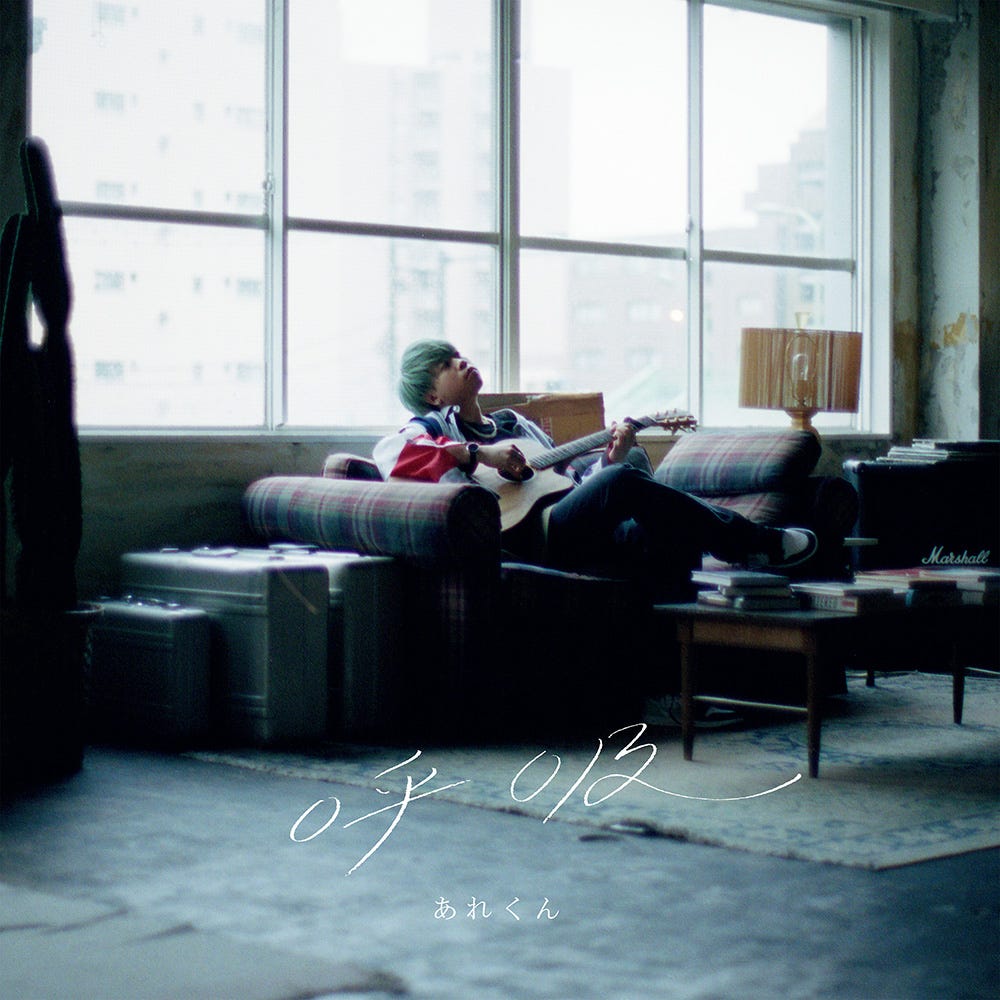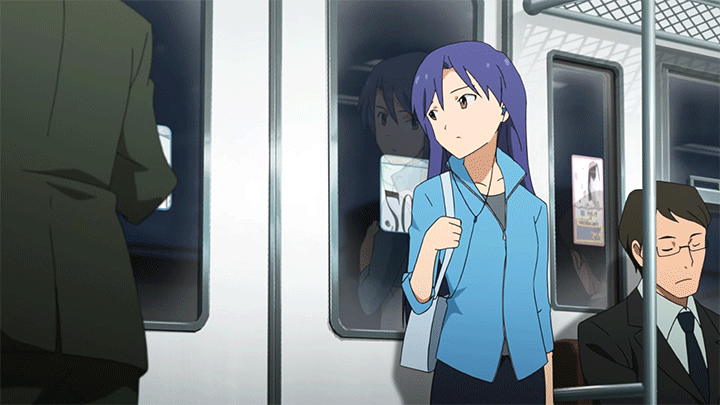Kokyuu by Arekun (Album Review) ▸ J-Music Exchange/Rate
The acoustic guitar: a singer-songwriter’s best friend
The acoustic guitar: a singer-songwriter’s best friend
Hello and welcome back to another installment of the J-Music Exchange/Rate! In case you’re new around here, this is a segment that I do with my good friend/fellow Japanese music fan Leap250 where we both pick out an album from our own libraries, exchange them with each other, listen to ‘em and later discuss on our respective blogs. Ever since we restarted the segment back in 2020, we’ve been reviewing albums (almost) every month, as this does give us the opportunity to both share some great stuff amongst the two of us and also be much more exposed to other genres we may not be too familiar with. And we hope that you all reading have a similar experience!
And as always, Leap and I come up with a specific theme each month to base our album choices on. It was Leap’s turn for the month of September, and he thought it would be cool to talk about albums that have an unplugged/acoustic vibe (which does feel fitting, as we enter the fall/autumn season). As I mentioned in the previous post I made, I did grow up liking artists & singer-songwriters who emphasized using an acoustic guitar in their songs, and that appreciation most certainly continued as I began discovering music from Japan. Add on the fact that this type of music tends to have a more straight-forward and raw sound to it, which is another huge reason why I’m a fan of it. So that’s what we’re dealing with today.
That said, here’s what we chose: Leap tossed over Kokyuu from singer-songwriter Arekun, while I gave him another album from the same release year in THE CHARM PARK’s Bedroom Revelations.
Let’s jump right in!

Arekun (あれくん) is a singer-songwriter from Japan. He got his start with music in August of 2018, when he began uploading random covers, as well as his original, acoustic-focused compositions, on YouTube. As he branched out to other social media platforms like TikTok, his songs garnered a lot of attention from more and more people, with his first release in “Baka” becoming a significant hit (currently has 10+ million views on YouTube). The pleasant melodies and relatable lyricism made it easy for many to gravitate towards Arekun’s music, and it especially resonated with the teenage/young adult demographic. He would continue seeing success, as a handful of his later releases — such as 2020’s “Sukinisasetakuseni” — helped put his name on the map and eventually led to him putting out his first major album, Kokyuu, in the latter part of 2021. Additionally, Arekun is a member of the three-piece musical unit Yoin, alongside guitarist Ryoma and pianist Iwamura Misaki.
As of this post’s publication, Arekun has released one album, two EPs and twenty-two singles.
(info sources: Rockin’ On Japan, encore, Universal Music Japan)
Tracklist
Light up
White Noise / ホワイトノイズ (Solo version)
Baka / ばーか。 (Album version)
Kimi wo Shitte / 君を知って
Sukinisasetakuseni / 好きにさせた癖に (Album version)
Zuruiyo / ずるいよ、、、
Ao / 青 (Kokyuu version)
Nanairo no Kureyon / 七色のクレヨン (Album version)
Tsukiakari / 月燈
Bye by me
Released: 2021.09.21
While acoustic guitar-driven singer-songwriter types have been quite prominent in the music scene (and still are), I’ve always found it interesting that this archetype tends to be predominantly female. That’s not to say male artists with an acoustic style don’t exist in Japan—they certainly do—but I’m referring more to the busker types, the ones covering songs on YouTube, X, and similar platforms. There’s a specific look and sound to these artists, and it feels like for every ten female artists I can think of that fit this mold, I might only be able to name one guy.
That’s why Are-kun stands out to me as one of the few male artists in that space. Interestingly, I first discovered him through a collaboration with female acoustic singer-songwriter riria. on a self-cover of his song “Ba-ka.” Since then, I’ve delved into his work, including his debut album Kokyuu here. The album feels like more of an introduction to his music, which is notable considering that by the time of its release, Are-kun had already achieved viral success, with two of his videos hitting over 7 million views on YouTube thanks to their popularity on Instagram and TikTok. Much of his following is among the youth, but Kokyuu seems like an effort to broaden his appeal to the general public, pushing him beyond the typical themes of love and romance that previously defined much of his work.
1 ▸ a new take on an old favorite
This month’s theme is actually one that I’m quite fond of and was excited to discuss. As I said earlier, as well as in many of my past posts (most recently in the medorē roundup from a few weeks ago), I grew up listening to music that had a heavy acoustic sound to it. My long-time love of artists like Jason Mraz, Jack Johnson and David Choi easily translated to my interest/fandom in Japanese music, as I’ve discovered so many cool JP artists and minds that use the acoustic guitar in so many cool ways. And while I’ve been more privy to the smooth, chill and relaxing tones shown in a lot of stuff from this area (as seen in the album I gave Leap for this month), listening to Kokyuu from Arekun honestly presented itself as a bit of a subgenre of acoustic music that I’m personally not that familiar with.
The album starts with a song titled “Light up”, and as you might suspect, this is quite a bright-sounding track. As you start to listen to Arekun’s sweet guitar licks and pleasant melodies, the song begins to add more and more to it, ranging from a modest drum beat to some light sparkly sound effects. It all eventually leads to a bold chorus that exerts a ton of energy, and with Arekun repeating the words of “hello, hello”, it really does feel like he’s giving you a warm welcome into this album he has created.
From then on, Arekun does continue to show off a more light-hearted and upbeat mood throughout the rest of this album, especially with that constant usage of feel-good & strong acoustic guitar solos, beautiful-sounding violins, cool drum loops, and even what I believed to be hand claps or finger snapping in certain places that were fun to hear now-and-then. As I will discuss a little later on, Arekun aimed to give off an overall lively and optimistic tone when putting this album together, and I do think he did a good job in that regard, especially in songs like “Baka”, “Sukinisasetakuseni”, and the aforementioned “Light up”.
Again, I’ll talk more about this in a second but Arekun did start off writing and performing songs that were on the sadder and gloomier side of things. And while he did decide to change it up quite a bit when creating Kokyuu, I do feel like you’re still able to get a good sense of a melancholic mood in the songs on this album. And to me, it’s pretty noticeable within his singing performances, as his deeper register and the heartfelt feelings that can be heard in his vocals honestly do give off a bit of a sentimental expression. Which does feel fitting since most of his songs deal with the ideas of love, romance, relationships and the complicated (and easily relatable) emotions that can come with it. Some good instances of it can be heard in “Kimi wo Shitte”, “Zuruiyo” and “Bye by me”; all of which, I thought, felt quite somber from Arekun’s vocal performances.
2 ▸ an interesting discussion about re-recordings
As you may have noticed in this album’s tracklist (at least, when looking at it on Apple Music, which I mainly use), many of the songs on here – more specifically, five out of the ten total tracks – include an indication in their titles, noting that these are actually different versions/re-recordings of already released compositions. Whether it’s “White Noise (Solo version)” or “Ao (Kokyuu version)”, it’s interesting to see Arekun go towards this particular direction when it came to compiling this album; both in the context of him and his personal approach towards music, as well as the Exchange/Rate segment.
Regarding the latter first, if you’ve followed the E/R for a few years now, there have been many albums that Leap and I have suggested to each other where an artist for-goed including the original version of a specific song, and instead threw in a (most of the time) significantly different iteration into the mix. Whenever this idea does come up, it has certainly been worthy of an extensive discussion, with Leap mostly preferring the opposite of what these artists, musicians and producers have chosen to do (see his reviews on Photon Maiden’s 4 phenomena and POLKADOT STINGRAY’s Zenchi Zennou).
I myself have run into this concept with a couple previous E/R reviews, and it really is an interesting thing to think about when it comes to ‘full-length’ album releases. Especially when ultra popular songs are in the equation, just throwing in a completely different variation of a song that many people have enjoyed and are already used to… I can understand why it may rub people the wrong way, since they’re most likely expecting to hear that familiar tune again when going through a particular artist’s album. And because Arekun does the opposite of that with this release of his, I felt the urge to actually go and listen to those original tracks and see how different they really are.
And boy oh boy, they really are different. The main thing I noticed in most of these previously released songs is that all of them are much, much more raw-sounding. So raw that essentially the only instrument being heard in them is an acoustic guitar and they actually do give off a heavy ‘unplugged’ and barely produced sound; almost as if Arekun just performed and recorded it by himself and called it a day. Compared to the re-recordings shown on Kokyuu, such as “Baka” featuring a myriad of bright-sounding instruments like a lively keyboard/piano and prominent percussion, or the much more toned-down version of “Ao” (the original was performed alongside his band, Yoin, and takes on a traditional rock sound)… I definitely looked at this album in a much different light because of these comparisons; not only due to my own personal judgment and preferences when it comes to listening to different iterations of a song, but also understanding Arekun’s own perspective on it.
In an interview he did with Rockin’ On Japan, Arekun actually did provide an intriguing & sound reasoning on why he wanted to remix/re-do many of his past songs. Throughout the few years since their initial releases, he did say that he had improved his craft with singing and creating music *a lot* within that time frame, and ultimately felt that he wanted to recreate those tracks in that newly sharpened state of his. Arekun had a desire to show off his revamped self and how much he has learned when it comes to song-writing and producing, and from what I could tell, I can definitely notice the differences. It’s pretty amazing to hear the way he turns a somber and slow-paced track like “Sukinisasetakuseni” into something that sounds incredibly brighter and atmospheric, which as a result, can make you feel warm inside. Or, to echo what he mentioned in that same interview, “Nanairo no Kureyon” as a whole felt a bit gloomy but in this newer take on it, he strived to give it a much more positive energy through the addition of some electric guitar and drumming performances that exert a happier mood.
That said, I actually enjoyed reading about Arekun’s new (at least, to me) perspective on doing these re-recordings. I can tell that he takes music seriously, and the fact that he was willing to try new things, stray away from the sound/vibe he has been known for through his already established popularity, and essentially be true to himself and the kind of music he wanted to create… it’s something that, I feel, you can’t help but to praise. Obviously, me – as well as Leap and every other person who has listened to Arekun – liking or preferring one variation over the other is a different story. And I do have my preferences; albeit, all over the place since I am a fan of that ‘unplugged’ acoustic sound heard in those OG versions, while also enjoying some of the unique elements he added in a few particular tracks.
But for me, being able to experience both iterations of this set of songs and enjoying each of them in their own respective ways was an approach I didn’t expect to take when I first went into this album. Yet, to be quite honest, how Arekun executed this made a lot of sense to me. The original versions of “Baka” or “Sukinisasetakuseni” or “Ao” could very well be viewed as ‘foundations’ or ‘rough drafts’ of a song, and Arekun was just able to build off of that raw acoustic sound over time to create something even more complex and layered.
However, it is worth noting that this album was my very first exposure to Arekun’s music, so I had no prior experience with any of those existing tracks. To that point, of course I understand that some people will prefer the previously released versions of these songs (at least, based on Arekun’s Spotify plays/stats), and that’s completely fine; there’s absolutely nothing wrong with that. But seeing his efforts of trying new things, and doing so in a pretty great fashion, I just gotta commend him for that.
I’ll be honest though, it took a few tries to actually vibe with this album.
Like I mentioned earlier, I do feel like I’m a bigger fan of acoustic music that takes on a more low-key energy and something that I just can chill out with, and I think it’s clear that Arekun’s sound is a little different from what I’m used to. And in no way am I saying that the upbeat and ‘louder’ side of acoustic music is not favorable, as I do like listening to songs of that nature from time-to-time and I think what was shown on Kokyuu is a good example of exactly that. Not only were Arekun’s skills on the acoustic guitar shown in full display, but I also thought that his ability to additionally mix in some interesting sounds and tones to it – such as what he described to be an ‘EDM’ feel in “Baka” – was pretty nice and it all blended together quite well, in order to create a pleasant atmosphere in a lot of these tracks.
And as pointed out a few paragraphs ago, I can imagine a lot of people, especially long-time fans of Arekun’s work, finding those freshened-up re-recordings to be not as appealing as their original counterparts. Which is fine. But for what it’s worth, as well as looking at it through the perspective that I came in with when first listening to this album, I do appreciate the care and effort he put into with these re-done versions, as he really did bring a lot more life and character to most of those re-recordings. Plus, if anything, both iterations sound great and it’s interesting to go back-and-forth between the past and the present.
Rating: 8/10
Aaaand that’s all I got for you today!
Fun album, for sure. Never heard of Arekun before Leap gave this to me but I do mess with his stuff and I can tell why a lot of people like him, especially in this environment we’re currently in where aspiring musicians can easily gain a platform through social media. Plus as a bonus, I enjoyed listening to some of his nice acoustic covers, like of ZUTOMAYO’s “Byoushin wo Kamu” or “Kumo to Yuurei” from Yorushika. Guy’s got a great talent on the acoustic guitar!
Now that you’re done here, definitely head on over to Leap’s blog where I got him to talk about an album from THE CHARM PARK, titled Bedroom Revelations. I’ve liked TCP’s music a lot over the years, especially for a reason I explained in the blurb I provided, so definitely go check it out by clicking here!
Thanks for reading!! :D
-al













